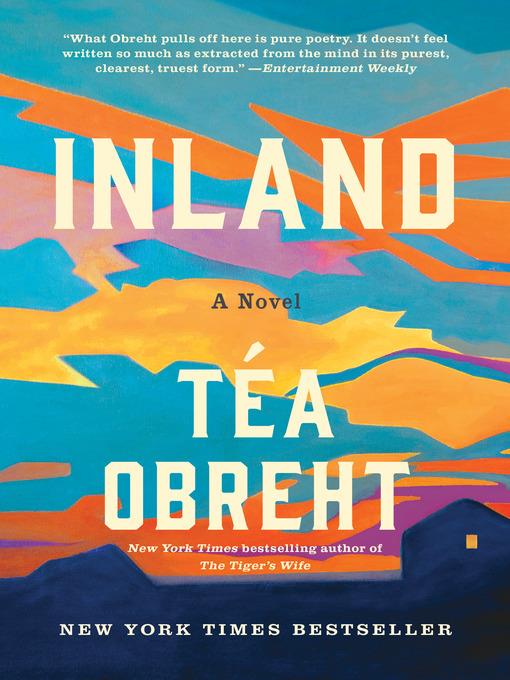
Inland
A Novel
کتاب های مرتبط
- اطلاعات
- نقد و بررسی
- دیدگاه کاربران
نقد و بررسی

May 2, 2011
Obreht, named last year as one of the New Yorker's 20 novelists to watch under the age of 40, makes her debut with this magical-realist evocation of a country in wartime. The author, herself an immigrant to the U.S. from the former Yugoslavia, transforms a young woman's memories of her grandfather's stories into a kaleidoscopic portrait of her former country's traumatic history. The book is read in tag-team fashion by Susan Duerden and Robin Sachs. Sachs sounds gravelly, grouchy, and well-pickled in various alcoholic libations; Duerden is British, plummy, arch, and delicate in her intonations, reverberating into near-Cockney working-class tone. The unlikely combination is surprisingly pleasing, nicely matching the contrast between Obreht's elaborate storytelling conceit and its grubby, homely details. A Random hardcover.

March 1, 2019
Obreht won National Book Foundation 5 Under 35 and New Yorker 20 Under 40 honors with publication of 2011's The Tiger's Wife, an Orange Prize winner and National Book Award finalist. Here she settles in late-1800s Arizona territory, where Nora awaits her husband's return with water for their dried-up farm even as her two older sons vanish after fighting. Meanwhile, former outlaw Lurie weaves his way into Nora's life.
Copyright 2019 Library Journal, LLC Used with permission.

June 1, 2019
A frontier tale dazzles with camels and wolves and two characters who never quite meet. Eight years after Obreht's sensational debut, The Tiger's Wife (2011), she returns with a novel saturated in enough realism and magic to make the ghost of Gabriel García Márquez grin. She keeps her penchant for animals and the dead but switches up centuries and continents. Having won an Orange Prize for The Tiger's Wife, a mesmerizing 20th-century Balkan folktale, Obreht cuts her new story from a mythmaking swatch of the Arizona Territory in 1893. The book alternates between the narratives of two complex, beset protagonists: Lurie, an orphan and outcast who killed a boy, and Nora, a prickly frontierswoman with her own guilty conscience. Both speak to the dead. Lurie sees ghosts from early childhood and acquires their "wants," while Nora keeps up a running conversation with her daughter, Evelyn, dead of heatstroke as a baby but aging into a fine young woman in her mother's mind. Obreht throws readers into the swift river of her imagination--it takes a while to realize that Lurie is addressing all his remarks to a camel. The land is gripped by terrible drought. As Nora's homestead desiccates, her husband leaves in search of water, and her older sons bolt after an explosive dispute. An indignant local drunk wonders whether "anybody else in this town [had] read an almanac or history in their lives? What were they all doing here, watching the sky, farming rock and dust?" Still, a deep stoicism, flinty humor, and awe at the natural world pervade these characters. They are both treacherous and good company. Here is Nora, hyperaware of a man who's not her husband: "Foremost on her mind: the flimsiness of her unlaundered shirt and the weight of her boots." Lurie, hiding among the U.S. Army's camel cavaliers (you can look them up), is dogged down the years by Arkansas Marshal John Berger. Their encounters mystify both men. Meanwhile, there are head lice, marvelous, dueling newspaper editorials, and a mute granny with her part to play. The final, luminous chapter is six pages that will take your breath away.
COPYRIGHT(2019) Kirkus Reviews, ALL RIGHTS RESERVED.

Starred review from June 17, 2019
The unrelenting harshness of existence in the unsettled American West sharply focuses what Obreht (The Tiger’s Wife) refers to as “the uncertain and frightening textures of the world” in this mesmerizing historical novel spun from two primary narrative threads. In one, homesteader Nora Lark waits with her son and niece for the return of her newspaperman husband with a supply of badly needed water for their house in Amargo, in the Arizona Territory in 1893. In the other, outlaw Lurie Mattie flees a warrant for murder by taking refuge in the Camel Corps, an all-but-forgotten experiment in history to import camels as beasts of burden in the 19th-century American Southwest. As Nora’s and Lurie’s paths gradually converge, Obreht paints a colorful portrait of the Western landscape, populated by a rogue’s gallery of memorable characters and saturated with spirits of the countless dead who attain a tangible presence, if only through the conversations they conduct in the minds of the characters whom they haunt. The novel’s unforgettable finale, evocative and grimly symbolic, crystallizes its underlying themes of how inconsolable grief and unforgivable betrayal shape the circumstances that bind its characters to their fates. Obreht knocks it out of the park in her second novel. Agent: Seth Fishman, the Gernert Company.

























دیدگاه کاربران